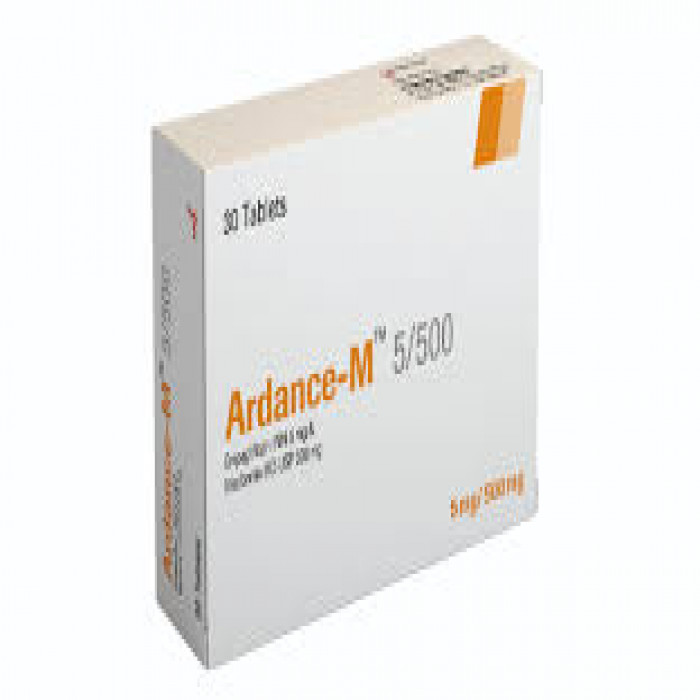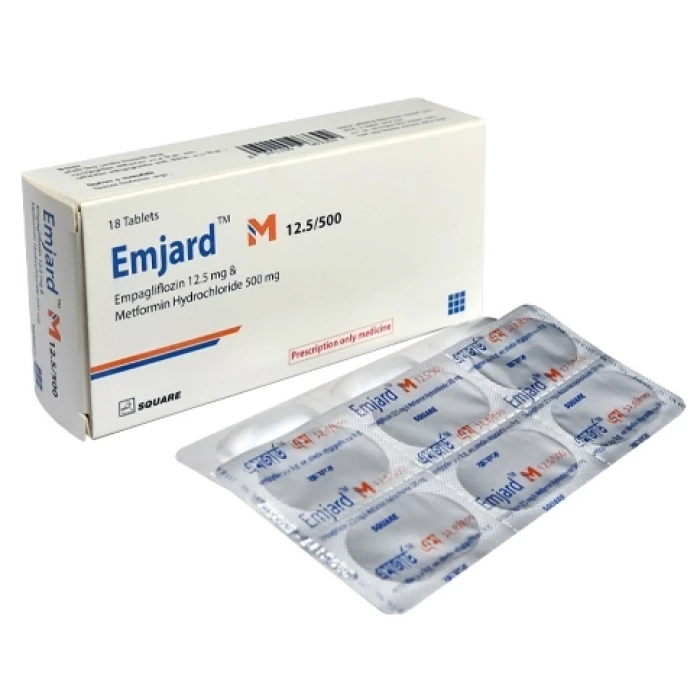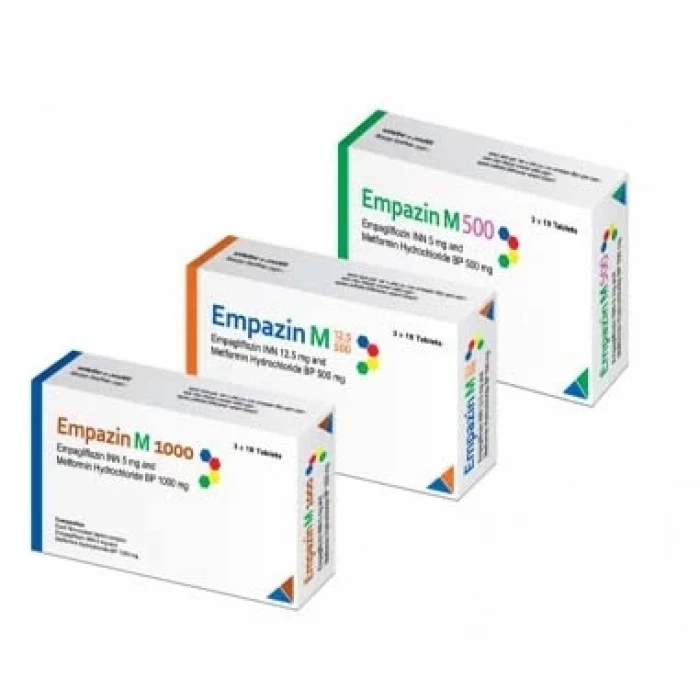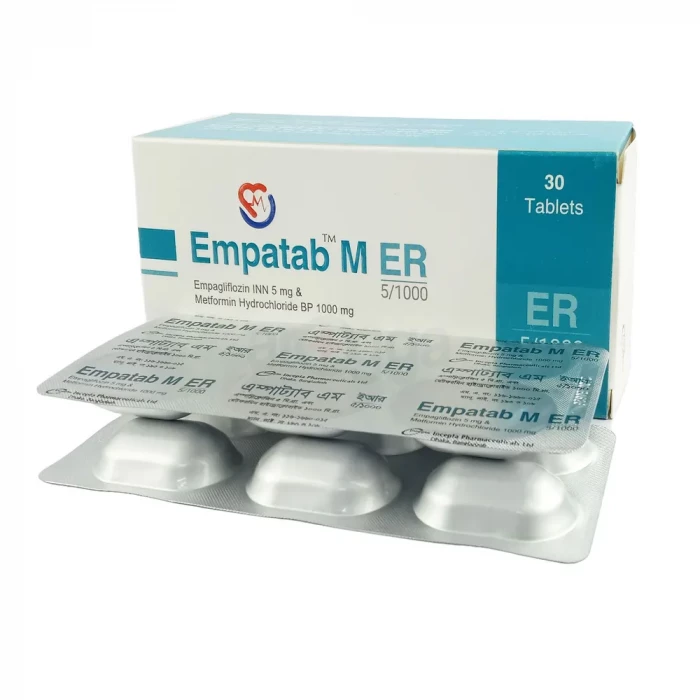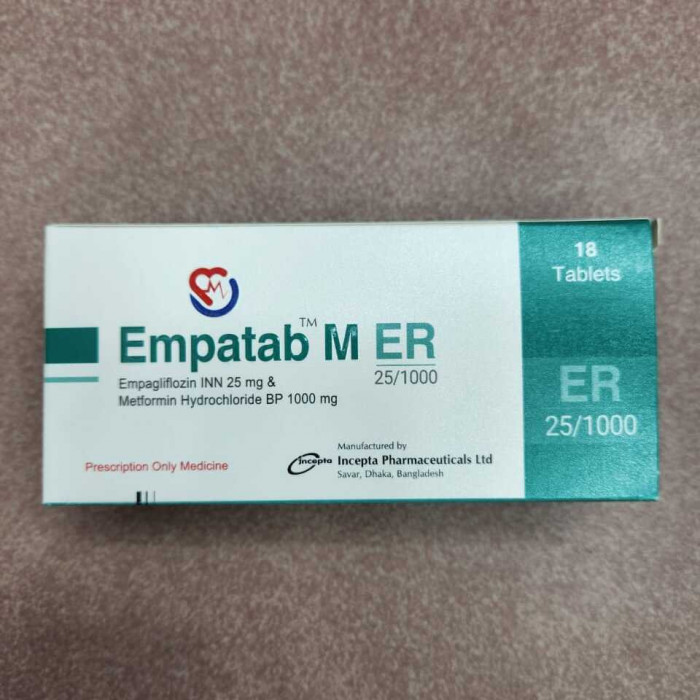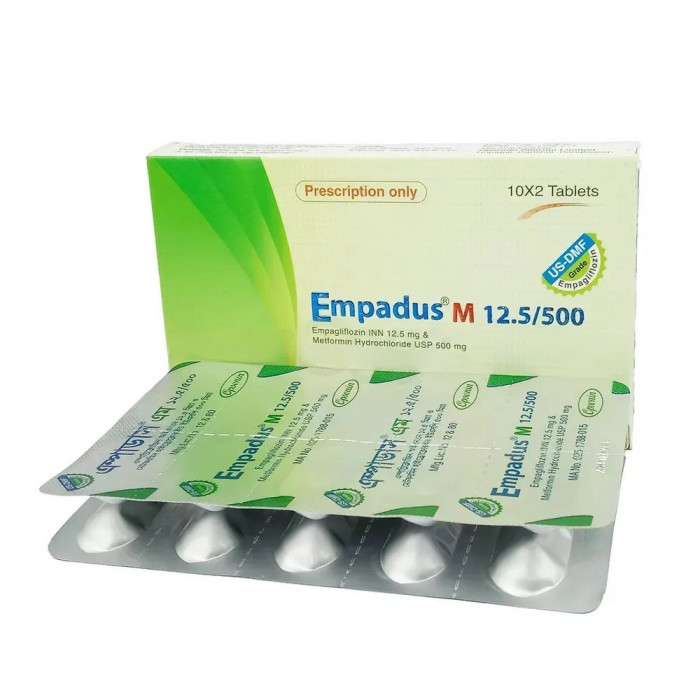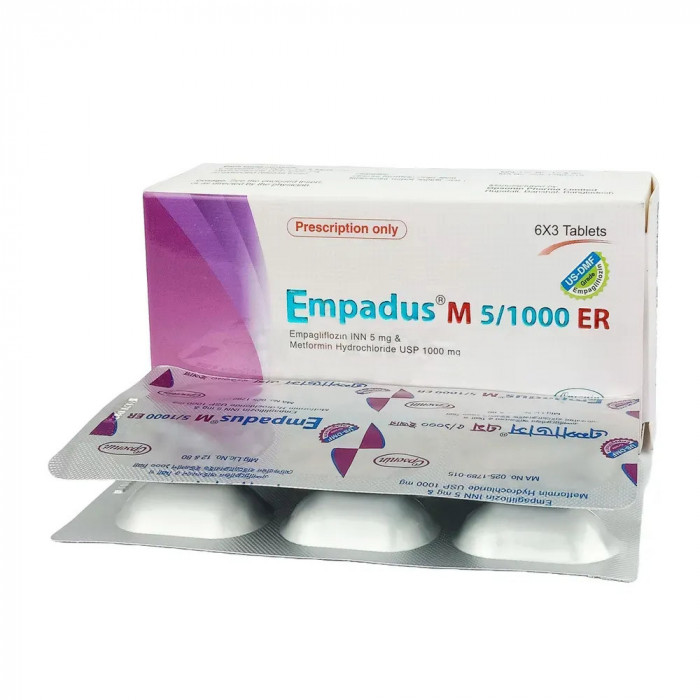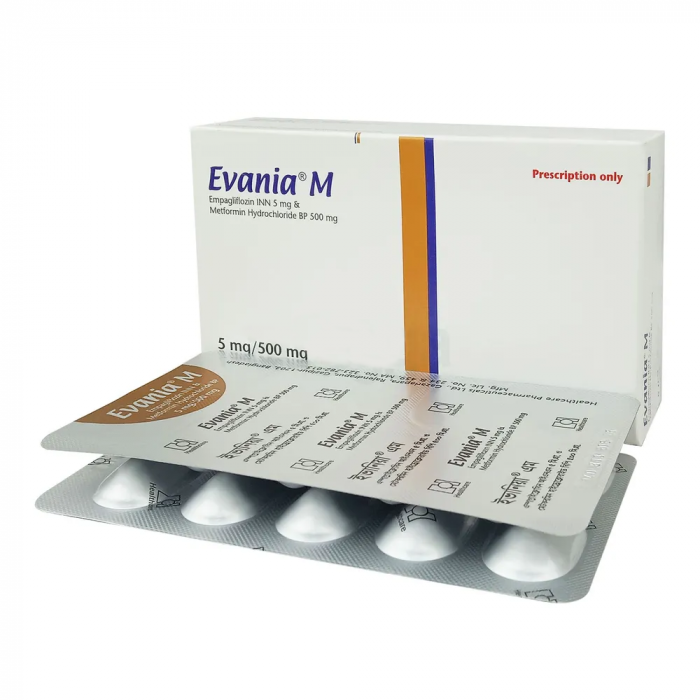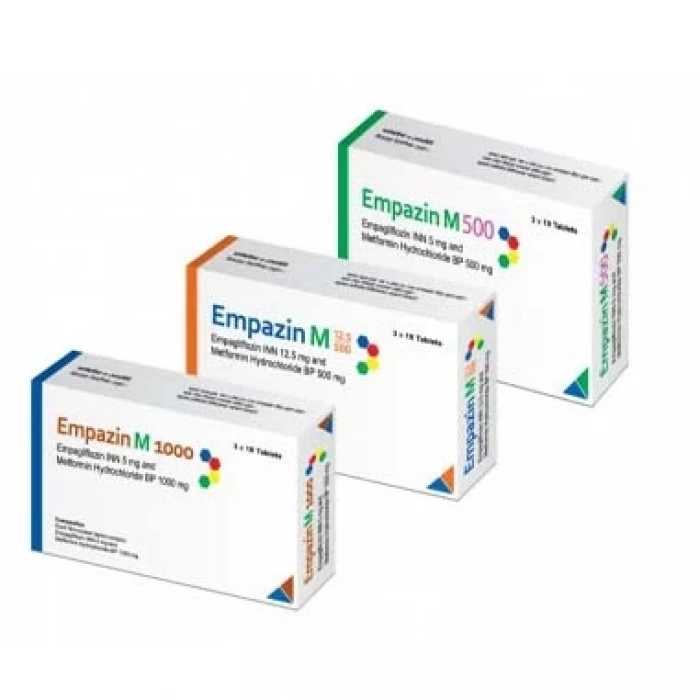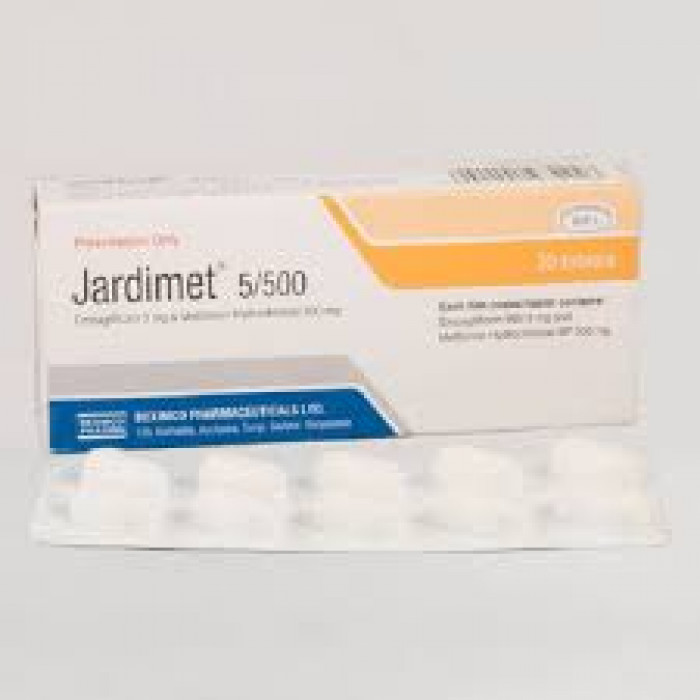
✔ 100% Authentic Product
👁️ Currently Viewing 2385
Jardimet 5/500mg Tablet 10pcs
Jardimet 5/500mg Tablet is an anti-diabetic medication. It contains a combination of empagliflozin and metformin as active substances. Jardimet 5/500mg Tablet is used for the management of type 2 diabetes in adults along with diet and exercise. Type 2 diabetes is a condition where your pancreas does not make enough insulin to effectively control the blood sugar level and your body is unable to use its own insulin effectively. This medicine works by lowering the blood sugar level. Take Jardimet 5/500mg tablet in the exact dose and duration as prescribed by your doctor. Before starting this medicine, inform your doctor if you are pregnant/breastfeeding and about your complete medical history. It is important to make certain lifestyle changes like having a balanced diet and regular exercise along with this medicine to help to manage blood sugar levels better.
Discount
Price: ৳ 196
MRP:
৳
200
2%
Off

100% Genuine Products, Guaranteed

Safe & Secure Payments, Always

Fast, Secure & Efficient Delivery

Proper Packaging
 Cash on Delivery - All over Bangladesh
Cash on Delivery - All over Bangladesh Regular Delivery - 12-24 Hours, Dhaka City* Charge Tk.39-59
Regular Delivery - 12-24 Hours, Dhaka City* Charge Tk.39-59 Regular Delivery - 24-48 Hours, Other Cities* Charge Tk.99-110
Regular Delivery - 24-48 Hours, Other Cities* Charge Tk.99-110
🌙 রমযান অফার 🌙
 ফ্রি ডেলিভারিঃ - ৭৯৯ টাকা+ অর্ডারে, ঢাকা
শহরে
ফ্রি ডেলিভারিঃ - ৭৯৯ টাকা+ অর্ডারে, ঢাকা
শহরে ফ্রি ডেলিভারিঃ - ২৭৯৯ টাকা+ অর্ডারে, ঢাকার
বাহিরে
ফ্রি ডেলিভারিঃ - ২৭৯৯ টাকা+ অর্ডারে, ঢাকার
বাহিরে
📲 মোবাইল অ্যাপ অর্ডারে সাশ্রয় বেশী
-
Google Play Store থেকে ডাউনলোড
-
Apple Store থেকে ডাউনলোড
100% Genuine Products, Guaranteed
Safe & Secure Payments, Always
Fast, Secure & Efficient Delivery
Proper Packaging
 Cash on Delivery - All over Bangladesh
Cash on Delivery - All over Bangladesh Regular Delivery - 12-24 Hours, Dhaka City* Charge Tk.39-59
Regular Delivery - 12-24 Hours, Dhaka City* Charge Tk.39-59 Regular Delivery - 24-48 Hours, Other Cities* Charge Tk.99-110
Regular Delivery - 24-48 Hours, Other Cities* Charge Tk.99-110 ফ্রি ডেলিভারিঃ - ৭৯৯ টাকা+ অর্ডারে, ঢাকা
শহরে
ফ্রি ডেলিভারিঃ - ৭৯৯ টাকা+ অর্ডারে, ঢাকা
শহরে ফ্রি ডেলিভারিঃ - ২৭৯৯ টাকা+ অর্ডারে, ঢাকার
বাহিরে
ফ্রি ডেলিভারিঃ - ২৭৯৯ টাকা+ অর্ডারে, ঢাকার
বাহিরে- Google Play Store থেকে ডাউনলোড
- Apple Store থেকে ডাউনলোড
🌙 রমযান অফার 🌙
📲 মোবাইল অ্যাপ অর্ডারে সাশ্রয় বেশী
✅ Description:
Jardimet 5/500mg Tablet is a combination medication containing Empagliflozin and Metformin, which are antidiabetic agents. It is prescribed for the treatment of type 2 diabetes mellitus in adults who have not responded well to metformin alone or in combination with other antidiabetic medications. It can also be used with other medicines, including insulin, to better control blood sugar levels.
Type 2 diabetes is a chronic condition characterized by insufficient insulin production or reduced insulin effectiveness. Symptoms may include frequent urination, excessive thirst, increased hunger, fatigue, and blurred vision.
In addition to taking Jardimet 5/500mg Tablet as prescribed, it is important to follow a regular exercise routine and adhere to a recommended diet plan for optimal results. Alcohol consumption should be avoided during treatment, as it can worsen the existing condition.
If you experience conditions associated with dehydration, such as vomiting, diarrhea, fever, heat exposure, or decreased fluid intake, it may be necessary to temporarily discontinue Jardimet 5/500mg Tablet. Your kidney function will be monitored by your doctor at least once a year, or more frequently if you are elderly.
For diabetic patients, it is advised to regularly check their feet and follow any additional foot care instructions given by their doctor. Jardimet 5/500mg Tablet is generally not recommended for use in pregnant or breastfeeding women, including children and adolescents under 18 years of age, due to limited safety data.
The most common side effects of Jardimet 5/500mg Tablet include hypoglycemia (low blood sugar), nausea, vomiting, diarrhea, excessive thirst, changes in taste, or dizziness. If any of these side effects worsen, it is important to consult your doctor.
Safety Advices

Alcohol
UNSAFE
Avoid consumption of alcohol while takingJardimet 5/500mg Tablet since it may increase the risk of lactic acidosis.

Pregnancy
CONSULT YOUR DOCTOR
Jardimet 5/500mg Tablet is not recommended for use in pregnant women. Consult your doctor before taking Jardimet 5/500mg Tablet.

Breastfeeding
CONSULT YOUR DOCTOR
Jardimet 5/500mg Tablet is not recommended for use in breastfeeding women. Consult your doctor before taking Jardimet 5/500mg Tablet.

Driving
CAUTION
Do not drive or operate any tools or machines if you experience dizziness after taking Jardimet 5/500mg Tablet.

Kidney
UNSAFE
Jardimet 5/500mg Tablet is not recommended for use in patients with severe kidney disease. Consult your doctor before taking Jardimet 5/500mg Tablet.

Liver
UNSAFE
Jardimet 5/500mg Tablet is not recommended for use in patients with liver problems. Consult your doctor before taking Jardimet 5/500mg Tablet.
✔️ Uses of Jardimet 5/500mg Tablet
- Treatment of Type II Diabetes Mellitus
✔️ How does
Jardimet 5/500mg Tablet effectively reduces blood glucose levels, whereas empagliflozin acts by blocking the activity of a protein called sodium-glucose co-transporter 2, which is responsible for the tubular reabsorption of glucose into the bloodstream and metformin acts by reducing the amount of glucose released into the bloodstream by the liver, thus helps in reducing blood glucose levels.
✔️ Side Effects of Jardimet 5/500mg Tablet
- Nausea
- Vomiting
- Abdominal pain
- Thrush (genital yeast infection)
- Skin rash, redness, or itching with raised bumps or blisters
- Change in taste
- Excessive thirst
- Diarrhea
- Loss of appetite
✔️ Quick Suggestions:
- You have been prescribed this combination medicine as it can control blood sugar better than metformin alone.
- It also reduces the risk of heart attack, heart failure, or other cardiovascular events.
- You should continue to exercise regularly, eat a healthy diet, and take your other diabetes medicines (if prescribed) along with Jardimet 5/500mg Tablet.
- Take it with food to lower your chance of having an upset stomach.
- Practice good genital hygiene to prevent yeast or urinary tract infections
- It may cause your body to lose too much fluid (dehydration) or you urinate more often. Drink plenty of water and stay hydrated.
- It can cause hypoglycemia (low blood sugar level) when used with other antidiabetic medicines, alcohol, or if you delay or miss a meal. Monitor your blood sugar level regularly.
- Always carry some sugary food or fruit juice with you in case you experience hypoglycemia symptoms such as cold sweats, cool pale skin, tremors, and anxious feelings.
✔️ Indication of Jardimet 5/500mg Tablet
Jardimet 5/500mg Tablet is used to treat type II diabetes mellitus in addition to diet and exercise among adults who remain unresponsive to therapy with either metformin alone or in combination with other antidiabetic medicines
✔️ Pharmacology
Empagliflozin is a sodium-glucose co-transporter 2 inhibitor (SGLT2). The main transporter, SGLT2, is in charge of reabsorbing glucose from the kidney and reintroducing it into circulation. Empagliflozin decreases renal reabsorption of filtered glucose, lowers the renal threshold for glucose, and therefore improves urine glucose excretion via inhibiting SGLT2.
Metformin Hydrochloride is an oral antihyperglycemic medication of the biguanide class that is used to treat type 2 diabetes. It reduces both basal and postprandial plasma glucose levels. It does not result in hypoglycemia. Metformin Hydrochloride reduces hepatic glucose synthesis, lowers intestinal glucose absorption, and increases insulin sensitivity by increasing peripheral glucose uptake and utilization.
✔️ Dosage & Administration of Jardimet 5/500mg Tablet
The dosage of Jardimet 5/500mg Tablet should be determined individually based on its effectiveness and tolerability. It is recommended to take this combination twice daily with meals. To minimize gastrointestinal side effects associated with Metformin Hydrochloride, dose escalation should be done gradually.
The maximum recommended daily dose of Metformin Hydrochloride is 2000 mg, and for Empagliflozin, it is 25 mg.
Here are the recommended starting doses based on different scenarios:
- Patients already on Metformin Hydrochloride: Switch to Jardimet 5/500mg Tablet containing Empagliflozin 5 mg, maintaining a similar total daily dose of Metformin Hydrochloride.
- Patients already on Empagliflozin: Switch toJardimet 5/500mg Tablet containing Metformin Hydrochloride 500 mg, maintaining a similar total daily dose of Empagliflozin.
- Patients already treated separately with Empagliflozin and Metformin Hydrochloride: Switch to Jardimet 5/500mg Tablet, maintaining the same total daily doses of each component.
- Patients with volume depletion: Correct the volume depletion condition before initiating treatment with Jardimet 5/500mg Tablet, especially if they have not been previously treated with Empagliflozin.
- For patients with impaired renal function, it is important to assess their renal function before starting this combination. Jardimet 5/500mg Tablet is contraindicated in patients with an estimated glomerular filtration rate (eGFR) below 45 mL/min/1.73 m2.
Administration:
- Take Jardimet 5/500mg Tablet as a whole with sufficient water.
- Always take this medicine exactly as prescribed by your doctor.
- Take this medicine at the same time every day, preferably with meals for optimal benefits.
- Do not cut, break or chew the medicine.
- Do not consume more than the prescribed dose.
- Do not discontinue the medicine on your own without consulting your doctor.
✔️ Interaction
The risk of lactic acidosis may be increased when using inhibitors of carbonic anhydrase. It is advisable to conduct more frequent monitoring in such cases. Certain medications, such as Ranolazine, Vandetanib, dolutegravir, and Cimetidine, can reduce the clearance of Metformin Hydrochloride, leading to increased levels in the body. The potential benefits and risks of using these drugs together should be carefully considered.
Alcohol consumption can worsen Metformin Hydrochloride's effect on lactate metabolism, potentially increasing the risk of lactic acidosis. Patients should be cautioned about the hazards of excessive alcohol intake and advised to exercise caution.
It is important for healthcare professionals to be aware of these interactions and to inform patients about the potential risks associated with the concurrent use of certain medications and alcohol while taking Metformin Hydrochloride.
✔️ Contraindications
In individuals with moderate to severe renal impairment and End Stage Renal Disease, this combination is contraindicated (ESRD). It is also not recommended for patients who have metabolic acidosis, including diabetic ketoacidosis, or who have a history of severe hypersensitivity to Empagliflozin, Metformin Hydrochloride, or any of the excipients in this combination.
✔️ Pregnancy & Lactation
Inform pregnant women about the potential risk to their fetus, especially during the second and third trimesters. This is not advised if you are nursing.
✔️ Precautions & Warnings
- Lactic Acidosis: Cases of lactic acidosis have been reported with the use of Metformin Hydrochloride. If lactic acidosis is detected, immediate supportive measures should be taken in a hospital setting, and the use of this combination should be discontinued.
- Volume Status and Hypotension: Prior to initiating this combination, it is important to assess and correct volume status in patients with renal impairment, the elderly, those with low blood pressure, and individuals using diuretics. Close monitoring is recommended for signs and symptoms of hypotension, especially in clinical situations where volume depletion is expected.
- Ketoacidosis: Individuals exhibiting signs and symptoms of metabolic acidosis, irrespective of blood glucose levels, should be evaluated for ketoacidosis. If ketoacidosis is confirmed, the use of this combination should be discontinued immediately and appropriate treatment initiated.
- Acute Kidney Injury and Renal Function Impairment: Temporary discontinuation of this combination should be considered in cases of reduced oral intake or fluid loss. If acute renal injury occurs, immediate cessation of this combination and medical intervention is necessary.
- Urosepsis, Pyelonephritis, Fournier's Gangrene, and Genital Mycotic Infections: SGLT2 inhibitors, included in this combination, may increase the risk of urinary tract infections. Patients should be monitored for signs and symptoms of urinary tract infections and treated promptly if needed.
- Hypoglycemia: When initiating this combination, it is advisable to reduce the dose of insulin secretagogues or insulin to minimize the risk of hypoglycemia.
- Vitamin B12 Deficiency: Metformin Hydrochloride has been associated with vitamin B12 deficiency. Regular monitoring of hematologic parameters should be conducted on an annual basis.
- Increased LDL-C: Monitoring and appropriate management should be implemented as necessary for elevated LDL cholesterol levels.
- Macrovascular Outcomes: Currently, there is insufficient clinical evidence from trials to establish a definite reduction in macrovascular risk with this combination.
✔️ Storage Conditions
Maintain a temperature of less than 30°C and keep it away from light and moisture. Keep out of children's reach.
⚠️Disclaimer:
At ePharma, we’re committed to providing accurate and accessible health information. However, all content is intended for informational purposes only and should not replace medical advice from a qualified physician. Please consult your healthcare provider for personalized guidance. We aim to support, not substitute, the doctor-patient relationship.






